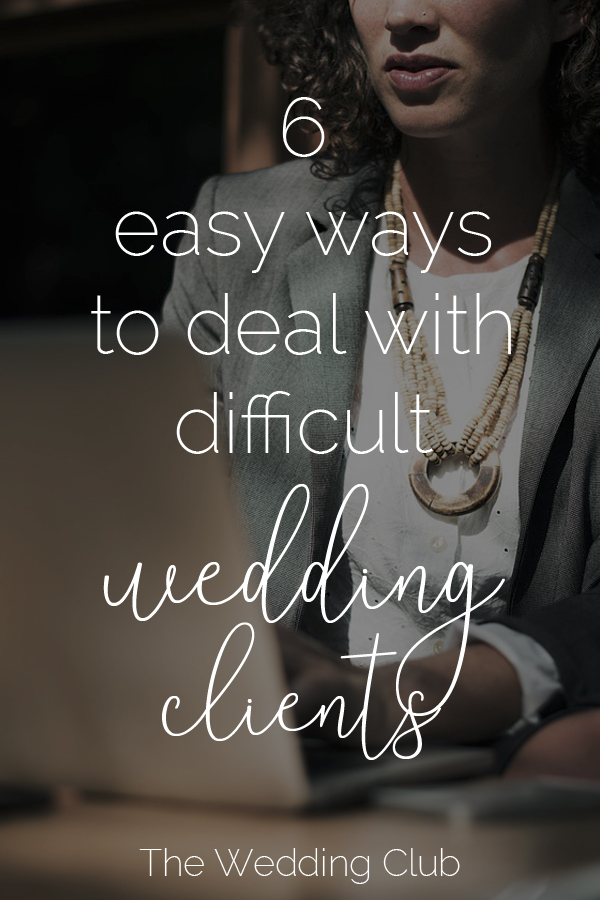 We have all encountered a difficult person in our lives before, and it is usually easy to get away from them. But how do you deal with someone difficult whom you have to work with? For instance, if it is a client, and you really need the money? We have done some research in the business sector and came up with easy ways to do this.
We have all encountered a difficult person in our lives before, and it is usually easy to get away from them. But how do you deal with someone difficult whom you have to work with? For instance, if it is a client, and you really need the money? We have done some research in the business sector and came up with easy ways to do this.
6 Easy Ways to deal with Difficult Wedding Clients
Identify your ideal client
To find out which clients you are comfortable working with and which ones not, you will have to identify your ideal client. The reason why this is important is because some planners like to work with difficult clients! They see it as a challenge and find it super rewarding after the wedding or event was a huge success. Others, like most of us, prefer to work with clients who are flexible and will give us room to do our job correctly.How to identify your ideal client
There are many strategies you can put into place to identify which type of clients you want to work with. We can give you the basics, but you will have to put some effort into these strategies and do some background research and lots of reading. Firstly, you can create a sort of checklist for yourself to determine which client suits you. Focus on different aspects of your client and try do come up with a ‘perfect client’. For instance, if you look at your client’s budget, what does this mean to you? Would you prefer large, flexible budgets to work with, smaller budgets because you like to be creative and improvise, or unlimited budgets? How should your client’s communication skills be? Do you prefer to talk to your client weekly, bi-weekly, every day? Are they responsive? Do they send messages and e-mails professionally and in full sentences? Does your client fit into a certain age group? Style? All of these factors can be taken into consideration. So, go make some coffee, sit down with a notebook and your favourite pen, and jot down the aspects of your perfect client. After you have done that, you have a fair starting point on which clients you want to work with. And don’t worry if the client that checks out on all the aspects don’t arrive soon. As long as you get a few clients that have at least two or three of those qualities, you’re bound to build a satisfying career for yourself. The next strategy for determining your ideal client is by having a set ‘contact strategy’ in place. What we mean by this, is that you determine how your clients get into contact with you. Did they stumble upon you in some random Facebook Group and shared your post with others? Did they see your ad somewhere on social media? Do you have a website with clear information and contact info? All of these can determine which type of clients contact you. Thirdly, you can decide on your clients based on their feedback. Do you have a form which they can fill out prior to your first meeting with them? This can be a great idea to eliminate unwanted clients – some people will not even bother to fill out this form… Is this really the type of client you want to work with? Finally, your base clients determine your future clients. If you had a string of successful weddings or events with past clients, then some of them are bound to recommend your to their friends, family or colleagues. Just be patient with this one, it will take time to start getting recommendations.Also Read:
- The pros and cons of being a wedding planner
- The ultimate valuable resources list for wedding planners
- 11 Things you can do to gain wedding planning experience
Dealing with difficult clients
Suppose that you are just starting out. We cannot simply expect you to just ‘fire’ your clients whenever you don’t want to work with them – because, you need their money to survive! So, we also have to look at what you can do when you didn’t land the perfect client. Instead, you are working with a client who has so many uncomfortable aspects, that you feel a sudden career change coming on. Don’t! There are ways to deal with these clients.-
Have a contract in place, always!
-
Breach of contract (when you can afford to fire a client, in extreme cases)
-
Approach your client
-
Have a clear contract and packages in place
-
Don’t be too nice
-
Summarize the important key points of the contract

by Tanya Guilfoyle
Born in Johannesburg, South Africa, Tanya has been an active contributor and planner in the wedding industry since 2016. When not writing useful content for brides and wedding professionals, she can be found designing templates for her Etsy shop, TWCprintables.


